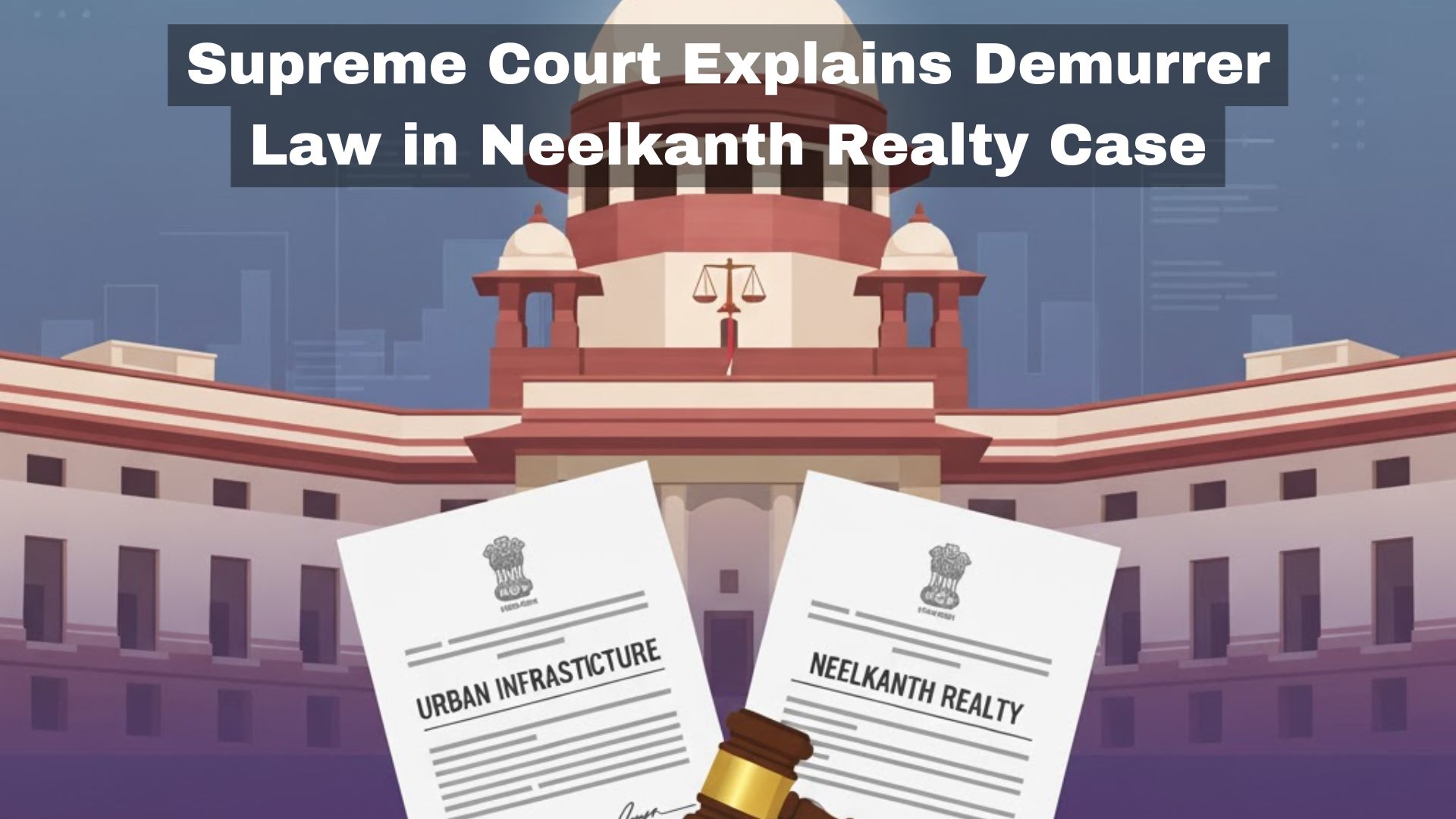
Supreme Court Clarifies Demurrer Law in Urban Infrastructure v. Neelkanth Realty
Bench rules demurrer must deal only with pure questions of law
Judgment strengthens clarity in arbitration and commercial disputes
By Our Legal Reporter
New Delhi: October 28, 2025: In a landmark judgment, the Supreme Court of India has clarified the scope of the legal principle of demurrer. The Court held that a plea of demurrer must be confined to pure questions of law and cannot extend to disputed facts. The ruling came in the case of Urban Infrastructure Real Estate Fund v. Neelkanth Realty Pvt. Ltd., decided by a bench comprising Justice J.B. Pardiwala and Justice K.V. Viswanathan in October 2025.
The decision is significant because it provides much-needed clarity on how courts should handle demurrers, especially in arbitration and commercial disputes, where parties often attempt to use demurrers to delay proceedings.
What is a Demurrer?
- A demurrer is a legal objection that accepts the facts stated in the opponent’s pleading as true but argues that, even if true, they do not amount to a valid legal claim.
- In simple terms, it says: “Even if everything you say is correct, you still don’t have a case in law.”
- The Supreme Court explained that a demurrer is a threshold test of legal sufficiency, not a tool to examine evidence or disputed facts.
Case Background
- The dispute arose between Urban Infrastructure Real Estate Fund and Neelkanth Realty Pvt. Ltd. over arbitration proceedings.
- The Bombay High Court had earlier dismissed an appeal under Section 37 of the Arbitration and Conciliation Act, 1996.
- The matter reached the Supreme Court through Special Leave Petitions (SLPs).
- The key issue was whether the plea of demurrer could be used to challenge the maintainability of claims at the arbitration stage.
Supreme Court’s Key Observations
The bench laid down important principles:
- Demurrer is Limited to Law:
- A demurrer can only be raised on pure questions of law.
- Courts must assume the facts in the plaint are true and then decide if the claim is legally valid.
- No Fact-Finding:
- Courts cannot use demurrers to test disputed facts or evidence.
- If facts are contested, the matter must go to trial or arbitration.
- Arbitration Context:
- The Court stressed that party autonomy in arbitration cannot override statutory provisions.
- Demurrers should not be misused to derail arbitration proceedings.
- Ex-Facie Test:
- The validity of a demurrer must be judged ex-facie the plaint—that is, on the face of the pleadings alone.
Broader Legal Context
This ruling aligns with earlier judgments where the Supreme Court has tried to balance efficiency in arbitration with fairness in procedure.
- In past cases, courts have warned against using preliminary objections to delay proceedings.
- The present judgment strengthens this line of reasoning by restricting demurrers to legal sufficiency only.
- It also reinforces the principle that arbitration cannot be stalled by technical objections unless they raise a clear legal bar.
Implications of the Judgment
- For Arbitration:
- The ruling ensures that arbitration proceedings are not unnecessarily delayed by frivolous demurrers.
- It strengthens the pro-arbitration stance of Indian courts.
- For Commercial Disputes:
- Businesses and investors gain clarity on how courts will treat preliminary objections.
- This promotes certainty and predictability in commercial litigation.
- For Legal Practice:
- Lawyers must now carefully frame demurrers, ensuring they raise only pure legal issues.
- Attempts to disguise factual disputes as demurrers are likely to be rejected.
Expert Reactions
- Legal Scholars: Many experts have welcomed the ruling, saying it prevents misuse of demurrers as delay tactics.
- Arbitration Practitioners: The judgment is seen as a boost to India’s image as an arbitration-friendly jurisdiction.
- Corporate Sector: Businesses believe the ruling will reduce litigation delays and improve investor confidence.
Conclusion
The Supreme Court’s ruling in Urban Infrastructure Real Estate Fund v. Neelkanth Realty Pvt. Ltd. is a landmark clarification on the scope of demurrers in Indian law. By holding that demurrers must be confined to pure questions of law, the Court has drawn a clear line between legal objections and factual disputes.
This decision will have a lasting impact on arbitration, commercial disputes, and civil litigation, ensuring that cases move forward without being bogged down by technical objections. It also strengthens India’s commitment to efficient dispute resolution in line with global best practices.
ALSO READ POPULAR ARTICLES
-
Supreme Court Opens Door for Vodafone Idea Relief in AGR Case
-
Delhi High Court Rules No Alimony for Financially Independent Spouse
-
Akshay Kumar Moves NCLAT Against Edtech Firm Over ₹4.83 Cr Dispute
-
SC Quashes Chhattisgarh Tender Clause Favoring Local Bidders
-
SC to Examine Validity of Securities Transaction Tax on Trading
-
SC Defers Vodafone Idea ₹5,606 Crore AGR Dues Hearing to Oct 13
-
Punjab & Haryana HC: Bail Can’t Be Cancelled for Seeking Hearing Exemptions
-
Delhi HC Protects Mankind Pharma’s ‘Kind’ Trademark, Bars Similar Names
-
Delhi HC Appoints Justice Rajiv Shakdher as Arbitrator in Playboy Bar Dispute
-
Karisma Kapoor’s Kids Challenge Sunjay Kapur’s Will in Delhi HC
-
SC Questions Dual Madras HC Hearings, Reserves Verdict on TVK Plea
-
SC Lets Judicial Officers With 7 Years Bar Apply for District Judge
-
SC to Hear Vijay’s TVK Plea Against SIT Probe in Karur Stampede
-
SC Probes Financial Irregularities in Indiabulls Housing: ED
-
Delhi HC Quashes 22-Year-Old Case Against Lawyer Over Basement Office
-
SC Seeks Rehab Plan for Cadets Injured During Military Training
-
SC PIL Seeks CBI Probe, Nationwide Review on Cough Syrup Deaths
-
Delhi HC Hikes Land Compensation for Yamuna Project Villagers
-
Punjab & Haryana HC: Bail Can’t Be Denied Over No Permanent Home
-
SC: Appellate Courts Can Correct Trial Court Evidence Errors